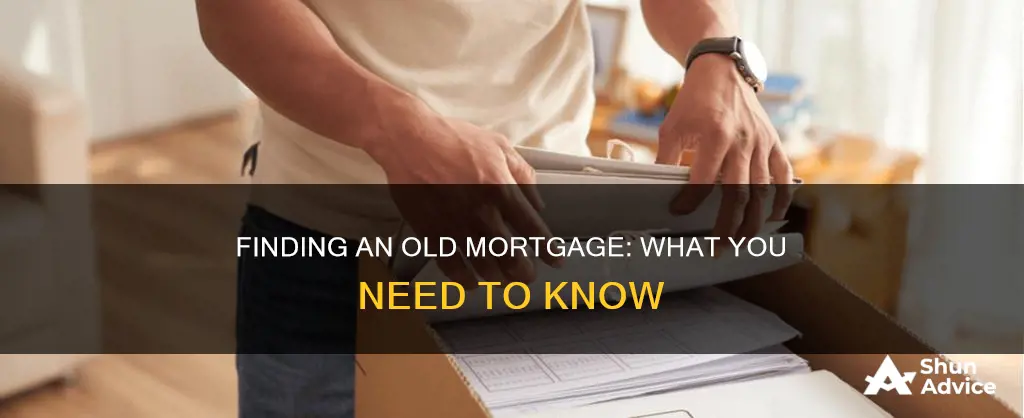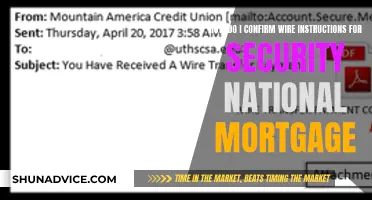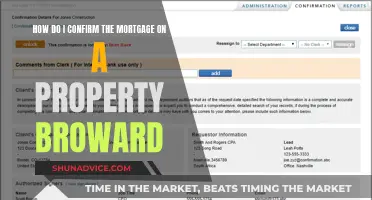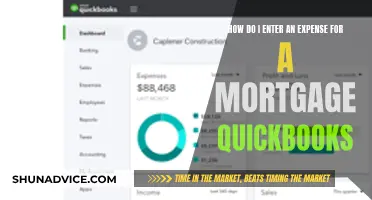
If you're looking to find an old mortgage, there are several ways to go about it. One way is to contact the mortgage lender, as they are required to keep copies of all records and respond to requests for information from borrowers. You can also try searching for public mortgage records, which are usually filed with the county the property is located in. These records can often be accessed through real estate websites, county clerk or public records offices, or the county recorder's website. Alternatively, you can contact the company that paid off your loan to find out if the lien was released, as this information may be relevant to your old mortgage.
| Characteristics | Values |
|---|---|
| Record availability | Online records may not be available for older mortgages. |
| Record location | County clerk's office, county recorder's office, or lender's office. |
| Required information | Property address, owner's name, block and lot number. |
| Record format | May be available as PDFs, TIFFs, or JPEGs. |
| Record fees | Fees vary by county and may be charged per page or as an upfront fee. |
| Record accessibility | Records are public and can be accessed by anyone. |
| Record content | Borrower's name, property address, maps, property value, tax assessment history, previous sales listings, etc. |
What You'll Learn

Contact the mortgage lender
If you are looking for old mortgage records, you can contact the mortgage lender and request copies of the mortgage, the note, and other closing documents. Your state's law may require mortgage lenders to keep copies of all records, and federal law requires them to respond to requests for information from borrowers.
You should request the copies in writing and send them to the address specified by the lender or servicer for information requests. This address can usually be found on the lender's website or your monthly statements, or you can call the lender's customer service department and ask for the address. Your request should be as specific as possible and include as much information as possible, such as your name, the property address, the loan or account number, and the documents you are requesting.
If you are trying to obtain a copy of the mortgage record, you can contact the county recorder's office with the full street address of the property. You can also look at public records in person at a district office during normal business hours or order copies by mail or phone. Some counties maintain an online index of property records and allow you to place orders through the county website. Fees for obtaining copies of property records vary by county, but you can expect to pay between $5 and $15 for a full set.
If you are trying to find out if your lien was released after paying off your mortgage, you can contact the company that paid off your loan. There may be a delay between the time you pay off your mortgage and the release of your lien. You can also check your state's property records, which will show whether your lien has been released.
Unlocking Home Equity: Borrowing Against Your Mortgage
You may want to see also

Search public records
Public records are a great way to stay informed about properties, taxes, and other issues. Freedom of Information (FOI) laws give the public access to certain data held by the government. The public has the right to receive information easily and at minimal cost to promote government openness and transparency.
Mortgage records are a part of public records and can be accessed by the public. These records are helpful when making an offer on a home. They contain information such as the property's legal description, address, lender, mortgage amount, and other details related to the property. They also show when a lender transfers a mortgage to another lending company and help determine the current value of the property.
To access these records, you can search for them online or visit the relevant office. Many counties have their real property (land) records available online, which can be found on the county website. These records may be listed under "public information", "land records", "Register of Deeds online", or a similar name. Alternatively, you can visit the county office in person to access the records. The name of the office that keeps the records may vary depending on the state.
Additionally, tax maps can be a useful tool to find information about a parcel of land. These maps are maintained by counties and include an inventory of land parcels, their tax value, and the owner's information. You can access these maps by visiting your county tax office or searching for them online on your county's website.
Applying for a Mortgage Holiday: What You Need to Know
You may want to see also

Contact the county clerk
If you are looking to find an old mortgage, one of the ways to do so is by contacting the county clerk. The mortgage records you need to access will be filed with the county the property resides in. You can either visit the county's public records or clerk's office in person or check their website to see if a search can be conducted online. For instance, Middlesex, New Jersey has a search system that is accessible seven days a week between 5:00 a.m. and 11:00 p.m. Some counties will not perform searches at all and will only provide copies of documents that you can already identify, so bring as much information as you can about the mortgage to find the documents more easily.
If you are unable to find the records online, you can head to the county clerk's office and perform a search in person at the register or recorder of deeds. The clerk can help you find the records you are looking for either by address or name. In some cases, you might need the block and lot number. If you need the owner's name, you may want to ask your real estate agent to call the listing agent for the information, as it won't be posted on the sales listing page.
If you are contacting the county clerk in person, it is a good idea to know what information you can expect to walk away with when conducting a public mortgage records search. Depending on the specific county, you'll most likely discover the borrower's name, the property address, maps or surveys of the property, the square footage of any dwellings, and the property's assessed value. You'll also be able to see previous sales listings and the property's tax assessment history.
Additionally, you can access the clerk's official website and download the mortgage documents online. However, online records often only go back a certain number of years. If your mortgage and deed were executed decades ago, the records might not be available online.
Assuming Deceased Husband's Mortgage: Florida's Legal Process
You may want to see also

Search online
If you are looking to find information about an old mortgage, there are several steps you can take to search online. Firstly, it is important to note that there is no central record of mortgages, borrowers, lenders, or account numbers. However, you may be able to find some information by searching public records and various websites. Here are a few suggestions:
- Check your own records: Go through your old documents, emails, and bank statements to see if you can find any information related to your mortgage. Old bank statements may show direct debits or payments made towards the mortgage.
- Contact the lender: If you remember the name of your lender, try contacting them directly. They may have records of your old mortgage, especially if it was a recent account.
- Use real estate websites: If you are looking for information about a specific property, real estate websites can be a helpful resource. These sites often display basic information about properties, such as their assessed value, sales history, and listing photos.
- Visit county websites or offices: All legally accessible mortgage records are typically stored with the county where the property is located. Many counties now have digital records, so you can try searching the county's public records website. Alternatively, you can visit the county clerk's office in person or call them to inquire about conducting a search.
- Utilise personal record search websites: If you have the name of the property owner, these websites can provide additional information about the homeowner, which may be useful in your decision-making or negotiation process.
- Check Land Registry: If you have the property address and remember the approximate dates of the mortgage, the Land Registry may hold records in the register of charges on the property.
It is important to note that some information, such as account numbers and other sensitive details, may not be available to the public. Additionally, if your mortgage is older, there is a chance that the records may no longer exist. In such cases, you may need to explore other options, such as seeking legal advice or contacting the Financial Ombudsman for assistance.
Comparing Mortgages: What You Need to Know
You may want to see also

Contact the lien release department
If you have recently purchased a home and bought title insurance but have not received a release within 90 days of closing, you should contact the title company that was involved with your transaction. If there is still no release, you should contact the Lien Release Department to find out why there is no recorded release. A mortgage lien holder has a legal obligation to release the lien when the debt is paid.
If the bank failed within the last two years and another bank purchased or acquired the failed bank, you should contact the acquiring bank. If the lien is for a subsidiary of a failed bank, the FDIC may also be able to assist you. Please contact FDIC DRR Customer Service at 888-206-4662.
You will need to provide a recorded copy of the mortgage or deed of trust document for which you are requesting a release. The copy must be legible and clearly show the recording information. This document can be obtained from the public records in the county where the property is located or from your title company or title attorney.
You will also need to provide proof that the loan was paid in full, which can be in the form of a Lienholder’s promissory note stamped "PAID", a signed HUD-1 settlement statement, a copy of the payoff check, or any other documentation evidencing payoff to the failed bank. The FDIC will not accept a copy of the borrower’s credit report as proof of payoff.
Contacting Nationstar Mortgage: Steps to Get Support
You may want to see also
Frequently asked questions
You can find an old mortgage by searching for the property address or owner's name through real estate websites and county clerk or public records offices.
You will need to provide the property address, owner's name, or block and lot number.
You can access the records by visiting the county's public records or clerk's office in person, or by checking their website to see if a search can be conducted online.
You can find the borrower's name, the property address, maps or surveys of the property, the property's assessed value, the property's square footage, the number of rooms, previous sales listings, and the property's tax assessment history.
You can check if your mortgage lien has been released by contacting the company that paid off your loan or by checking state property records.







